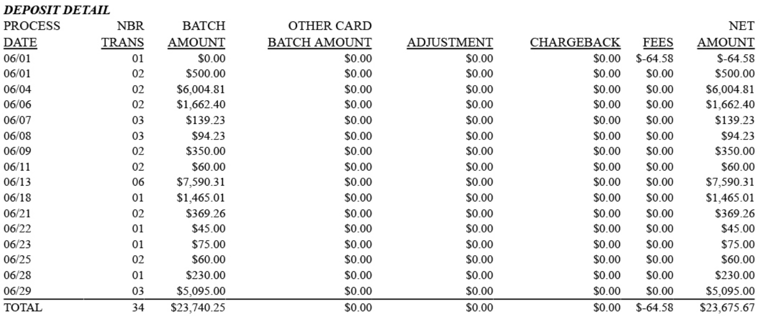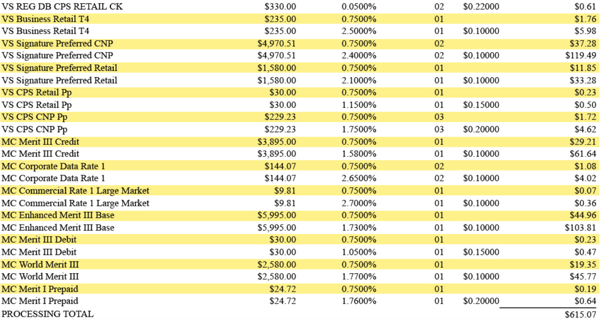At PayJunction, we provide a detailed breakdown of our customers’ bills each month, which we’ll discuss in detail below. For customers on Interchange-plus pricing, transactions are charged based on their wholesale cost (as dictated by the card brands Visa, MasterCard, Discover and Amex) plus a consistent provider markup.
The major benefits with Interchange-plus pricing are transparency and affordability. You know exactly what the true cost is for each transaction and how much money you’re paying your provider. In the processing-details section of our merchant statements, you can see each card type, the discount (or wholesale) rate and the transaction fee (or provider markup).
Payment Processing Demo
Schedule 15 minutes with a payments expert
Get a customized PayJunction product walk-through
Understand requirements and pricing
Determine your SAVINGS!
How to Read a Credit Card Statement on Interchange-Plus
Every PayJunction merchant statement is broken into five categories, which we’ll detail in this merchant statement example:
- Activity Summary: This first section covers the total volume processed for the month, and is broken down by payment type. Any refunds processed are listed here as well.

- Deposit Detail: The volume per batch is detailed in the next section. This information can be accessed in real time through our Virtual Terminal but is also listed on each monthly credit card processing statement for your reference.

If you deposit through Amex Direct, all Amex volume will be listed in the “Other Card Batch Amount” column. The deposit details section also lists the previous month’s fees as a debit, which is -$64.58 in the example above.
- Processing Detail: Upon first glance, you might think you’re seeing double. And you’re not wrong.
In the spirit of transparency, PayJunction’s Interchange-plus statements list each card type twice. You can see in this merchant statement example that PayJunction’s markup is a consistent 0.75% of the card volume.
The first entry, VS CPS Retail Check Debit, notes PayJunction’s markup of 0.75% on the $564.51 in VS CPS Retail Check Debit transactions. The second entry notes the 0.80% wholesale Interchange cost that will be paid to the card brands along with the flat-cent transaction fee. The $4.23 paid to PayJunction plus the $5.27 paid to the card brands bring the total fees paid for that card type to $9.50.
In this merchant statement, fees paid to PayJunction are highlighted in yellow, whereas wholesale costs remain in white.


- Authorization Detail: All transactions and associated fees are listed in this section. An authorization fee is a flat fee applied to each transaction.

- Other Detail: The last section includes any monthly or annual service charges, batch fees (labeled as “Capture Fees”) and processing costs known as pass-through fees. Think of these as the cost of running transactions with Visa, MasterCard, Discover and Amex.
 A summary is provided at the end of every statement with the processing, authorization and other totals, along with the total fees paid for the month’s billing cycle.
A summary is provided at the end of every statement with the processing, authorization and other totals, along with the total fees paid for the month’s billing cycle.

You can view the complete merchant statement on Interchange-plus pricing here.
Want more payment insights? Subscribe to our newsletter!
Do you have any remaining questions on how to read Interchange-plus merchant statements? Let’s start a conversation below.
